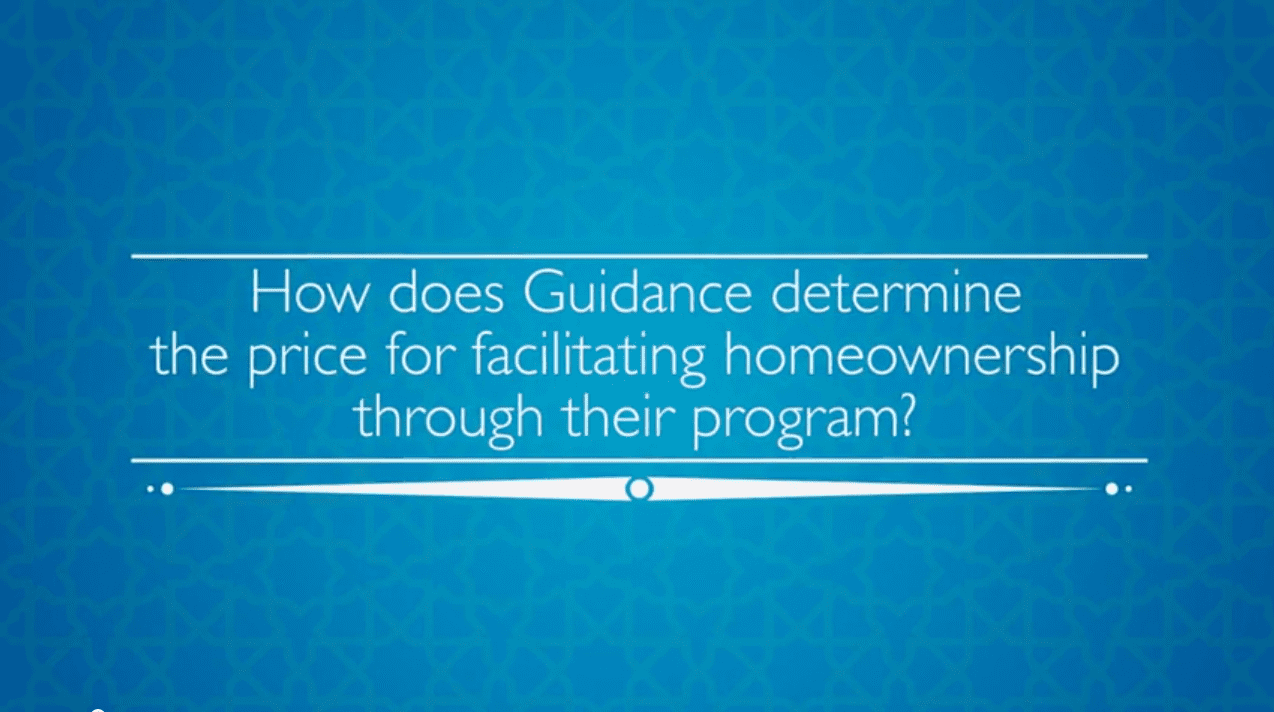What to Expect During the Islamic Mortgage Home Financing Process

Purchasing a new home is an exciting time, but it can also look like a complex process. But if you know the steps and what to expect, the mortgage process doesn’t have to be so complicated.
For most home buyers, this will be one of the biggest financial decisions you’ll make, so it’s important to choose the right home financing partner to guide you through the home buying process, from pre-approval to making your first payment.
You may have lots of questions about when to get pre-approved, which documents you need, and when can you begin house hunting.
In this blog, we’ll break down the mortgage approval process, from pre-approval to closing, highlighting key considerations and tips to help you find the solution that’s right for you, including mortgage alternatives for those seeking Shariah-compliant or interest-free options. Whether you’re looking to purchase your dream home or refinance an existing mortgage, gaining insight into this complex process will empower you to take control of your financial future.
Your 10-Step Guide to the Mortgage Approval Process
Going through the mortgage approval process may seem overwhelming, so we’ve put together this list for you to simplify the 10 steps to getting your mortgage application approved — from choosing a home financing partner to closing.
1. Choose a Home Financing Partner
Your home financing journey begins with choosing the right home financing partner.
While a conventional mortgage typically involves interest-based payments and standard lending criteria, Islamic or Shariah-compliant options follow different principles, such as co-ownership or leasing models, to avoid interest.
As you talk to a potential mortgage lender or Islamic home financier, take into consideration how responsive the representative is. Your first few interactions will shed light on what their future response rate will be like throughout the mortgage application process.
In addition to responsiveness, are they organized, knowledgeable and honest?
You will ultimately want to make this important decision based partly on practical considerations such as rate and whether their approach aligns with your values. If you are seeking a Shariah-compliant option, look for a partner that offers Islamic financing and be sure to compare different mortgage products to find the best fit for your needs. But this also needs to be someone you feel comfortable talking to, working with, and sharing your financial information with.
2. Get Pre-Approved for a Mortgage
To help guide you as you search for your new home, you’ll need a mortgage preapproval. This will keep your search within your budget and inform you about the monthly mortgage payment you can afford.
When applying for a mortgage, you’ll need to provide documents, including identification, gross monthly income, and employment documentation, so your home financing partner can determine how much you can afford. You will also need to demonstrate sufficient savings for the down payment and other related costs. Check out our full list of documents needed.
The Pre-Approval Advantage
Pre-qualification is different from pre-approval. Getting pre-qualified gives you a quick estimate of how much you can borrow based on the information you provide. Pre-approval, on the other hand, will require your home financing partner to verify your information by verifying your documentation and pulling your credit report.
A pre-approval involves a thorough review of your mortgage application, including your credit, income, assets, and debt to income ratio. It results in a conditional commitment from a lender on the amount of financing they are willing to offer you and the interest rate or profit rate you qualify for as well.
Pre-approval is important when you’re ready to start looking for a home. First, it gives you a clear budget to work with. It also shows real estate agents that you’re serious; in fact, many will not show you homes without a pre-approval letter. And it shows sellers that you are ready to buy, with financing already lined up, which makes your offer more attractive when you find a home you like. In a competitive market, having a pre-approval letter helps you move quickly and confidently when you find the right home, and it raises your chance of having your offer accepted.
3. Set a Budget for House Hunting
You may already be setting aside money for your new home. It is, after all, likely the biggest purchase you’ll make in your lifetime. Budgeting carefully will help you build equity in your home over time.
Start by assessing your income and current financial obligations to determine a comfortable price range. It’s advisable to use the general rule that your home price should be no more than three to five times your annual income, but this can vary based on your personal financial situation.
Get your budget in line to house hunt by figuring out how much income you’re bringing in as well as your monthly expenses. Then compare your monthly income against your expected monthly payments as part of your calculations.
In addition to the down payment, don’t forget to factor in closing costs, homeowners insurance, and maybe essential items for your new home.
Having these numbers on hand will help you see where you can cut back and put that money towards the house. Planning for all payments involved in the home purchase, including the down payment and monthly payments, will help ensure a smooth process. By setting a well-defined budget, you’ll be better prepared to find a home that meets your needs without stretching your finances too thin.
4. Find the Right House
After you’ve seen multiple houses, how do you know which one is the right one? Sometimes you’ll just know, but other times, use these tips to help you make a decision.
The Critical Lists
Start by making a list of your must-haves and deal-breakers, such as the number of bedrooms, location, proximity to schools, or access to public transportation. This will help you focus on properties that align with your lifestyle and needs.
Additionally, it’s important to explore different neighborhoods and assess factors like safety, community amenities, and potential for future growth. Visiting multiple homes during open houses can also provide valuable insight into what’s available within your budget, allowing you to compare features and layouts.
Consider the Future Too
Remember to envision your long-term plans — are you planning to expand your family, or are you looking for a place that could serve as a rental property in the future? Taking the time to thoughtfully evaluate your options can lead you to a home that not only meets your current requirements but also adapts to your future aspirations.
Each time you see a home that you’re considering, compare it against all your non-negotiables and then the nice-to-haves. This will help prevent you from being swayed by something appealing that will not make you happy in the long run because it’s missing something essential.
It’s important take the right amount of time you need to decide on your priorities, but do this ahead of time. Otherwise, once you find a house you love, there may be others in a similar position who may move faster and get an accepted offer before you do.
5. Make an Offer on the House
At this point, you’ve been pre-approved and set a budget, and you’ve gone house hunting and chosen your ideal home. Now, it’s time to make an offer.
Before making the offer and approaching the seller, strategize with your real estate agent. Lean on the expertise of your agent to decide how much to offer based on comparable homes in the neighborhood, the time it has been on the market and if other buyers are also having their eye on the same house.
If the seller comes back with a counteroffer, work with your real estate agent to negotiate.
6. Schedule a Home Inspection
Once your offer is accepted, you will need a home inspection. Your real estate agent can arrange that for you, but you can also search yourself and check reviews.
Don’t skip the property inspection. Some problems may not have been disclosed by the seller and should be flagged by the home inspector. This is a chance for you to check the condition of both the interior and exterior of the house; for example, the plumbing, roofing, heating, and cooling systems.
If the property turns out to have significant flaws or concerns, speak with your agent about potentially renegotiating the price you offered, or you can ask for a credit from the seller to cover the cost of repairs.
7. Begin Mortgage Processing
Congrats, your offer has been accepted, and you have a signed purchase agreement in hand! Now it’s time to submit your application for financing on that particular home with your chosen home financer.
During the mortgage processing phase, your financial information is collected and then reviewed by the underwriter. They may ask for additional information from you.
If you have already completed a pre-approval, this process is quicker as some of the work is already done.
8. Receive Home Appraisal
Your home financing company will require an appraisal, which is done by a third party. An appraiser will visit the home and determine if the purchase price is a fair price. The appraiser will look at the condition of the home as well as the prices of other homes in the area to the home’s value.
Note that this differs from the home inspection. It is not as in-depth and the appraiser won’t be looking for specific problems.
9. Undergo Mortgage Underwriting
This is the process taken to approve your financing. During the underwriting process, home financiers will look at your submitted application and supporting documents to determine if they will approve your application. They’ll take into account your financial history and credit and verify to see how risky it would be to partner with you.
Be honest and thorough about all income, debt, and credit history to avoid any delays. Underwriters may sometimes need additional information from you, so if you don’t receive updates, it’s a good idea to check in and follow up.
Again, if you were pre-approved before you began house-hunting, it will be quicker after you find your home.
10. Close on the Home
Congratulations! This is the final step before the house is officially yours and the keys are in your hand.
When the closing date is set, your real estate agent will schedule a final walk through the house, typically one day before, to make sure the home is ready for you to move in based on the condition that was agreed upon when signing the contract.
On closing day, make sure to have your photo ID, all the documents received during the financing process, and the funds for closing costs ready. A representative from your home financing partner may be there too as you sign final documents and receive your keys.
Understanding Islamic Finance
Islamic finance is a system of financial services that operates in accordance with Islamic law, or Shariah. At its core, Islamic finance prohibits the use of riba, or usury, which is considered unjust and exploitative under Islamic law. Instead of relying on interest-bearing loans, Islamic finance encourages risk-sharing between all parties involved in a transaction. This means that both the financier and the customer share in the risks, fostering a sense of partnership.
Along with prohibition of riba, another key feature of Islamic finance is its emphasis on asset-backed financing. Rather than lending money for interest, Islamic financiers invest directly in tangible assets, such as property, and their returns are linked to the performance of these assets. This approach is more ethical and sustainable compared to conventional finance, which centers on interest-based lending.
Halal Mortgage Options
For Muslims seeking to purchase a home without compromising their religious beliefs, halal mortgage options offer a practical and ethical alternative to conventional mortgages. Unlike traditional home loans, which are based on interest-bearing loans, halal mortgages are structured to comply with Islamic law.
The most suitable model of halal mortgage is called diminishing musharakah, in which the customer and the Islamic mortgage provider jointly purchase the property. Over time, the customer gradually buys out the financier’s share, increasing their ownership stake with each payment.
By choosing a halal mortgage, Muslims can avoid paying interest and instead participate in a partnership that reflects their values. Islamic mortgage providers and Islamic banks offer these products to help customers purchase property in a shariah-compliant way, making homeownership accessible while staying true to Islamic principles.
Islamic Scholars’ Perspectives
Islamic scholars play a vital role in guiding the development of Islamic finance and halal mortgages. Their expertise ensures that financial products remain true to Islamic principles and comply with Islamic law.
Many scholars emphasize the importance of risk-sharing in financial transactions, viewing this element as essential for a shariah-compliant system. They explain that conventional interest-bearing loans are incompatible with the ethical foundations of Islamic finance, as they place undue burden on borrowers and do not promote fairness.
Transparency and fairness are key concerns for Islamic scholars. They advocate for clear, honest agreements between financiers and customers, ensuring that all parties understand their rights and responsibilities. Ongoing scrutiny and regulation are encouraged to maintain the integrity of the industry.
By following the guidance of Islamic scholars, the Islamic finance sector continues to offer ethical, sustainable, and shariah compliant alternatives to conventional mortgages for Muslims and non-Muslims alike.
How Long Does the Mortgage Approval Process Take?
The entire process to purchase a home can take several months.
Getting pre-approved can be as quick as 24 hours. House hunting can take around three months, but it can be faster depending on if you already know what you’re looking for. And getting your mortgage approval done may take anywhere from 30 to 45 days to complete.
If you are looking to refinance an existing mortgage, some Islamic mortgage products offer flexible refinancing options and may allow early repayment without penalty, providing additional flexibility in managing your home financing.
Continue Your Homeownership Journey
Buying a home is one of the most important decisions you will make. The team at Guidance Residential is here for you every step of the way, from pre-qualification and pre-approval on through to finding the right real estate agent for you and your family. We invite you to explore the home buying process with Guidance Residential today.
Guidance Residential remains the #1 U.S. Islamic home financing provider. Over the past 20 years, we have assisted more than 40,000 families. Learn more and get started on your home finance journey today.
Your Guidance Residential Account Executive is here to help with any questions. Looking to refinance or purchase? Have a friend or family member who is looking for a home? Call 1.866.Guidance, or start an application today.
Originally published August 2021, updated September 2025.




